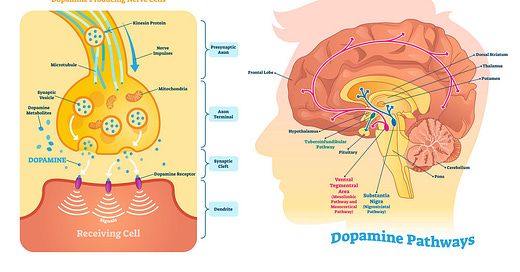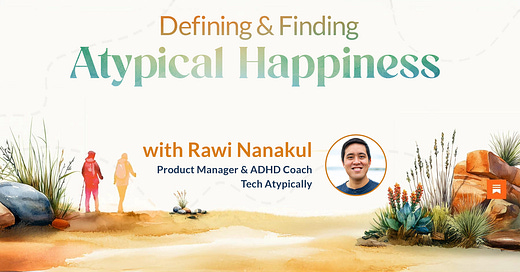
#32🎉 Core PM Skills - The Practice of Success (Science)
The science of norepinephrine and dopamine with a dash of brain hacking.
Welcome to Tech Atypically 👋, your weekly blog that explores the intersection of ADHD, product management, and the complexities of a neurodiverse life. In each issue, I dive into the science, stories, and strategies that can help you navigate the challenges of ADHD and being a product manager.
Part 7 of the Book of ADHD Product Management awaits you in this edition.
🐼Connect with me for free ADHD help
⭐Introduction
It was a struggle this week to come up with a science topic to write on the practice of success. I oscillated between dread and excitement. Dread from not knowing what to write about. Excitement because I would be learning something new. When I’m at my best, I’m curious and celebrate the success of new things. At my worst, each failure or unknown next step feels like a weight that stops me from moving and recognizing progress. Which made me made me think, why is my brain doing this? I took my ADHD meds today, I should be “stable”. What’s going on in there? This leads me to today’s topic, the science of dopamine and norepinephrine.
🦄Science - A tale of two neurotransmitters
Dopamine and norepinephrine are two neurotransmitters that play a significant role in the brain functions of people with ADHD. Dopamine is involved in reward processing, motivation, and the regulation of attention and focus. It helps in signaling the brain's reward system, which influences your ability to prioritize tasks and maintain attention. There is often dysregulation or deficiency in the dopamine system, leading to challenges in sustaining attention and staying motivated in tasks that are not immediately rewarding. Dopamine helps you start and keep going on tasks.
Similarly, norepinephrine, another neurotransmitter, is responsible for activating the brain's alertness and arousal systems. It helps regulate attention, vigilance, and the ability to shift focus. In individuals with ADHD, there is often a deficiency in norepinephrine, which can contribute to difficulties in maintaining sustained attention, being easily distracted, and experiencing restlessness or impulsivity. It helps you keep on task and make clear decisions. Whether it’s caffeine, Adderall, exercise, or silly cat videos, your ADHD brain is looking for hits of both neurotransmitters.
One could refer to it as "dysregulation" of neurotransmitters, but I prefer to view it as an opportunity to hack my brain. I choose to reframe my easily influenced emotions and focus as a chance to gain control over my brain. By understanding what causes these changes, I can manipulate them to suit my needs in any given situation.
For instance, I have realized that talking to people releases dopamine in my brain. Currently, I am struggling to write this paragraph. However, I decided to message a friend to check up on them. Hearing how they were doing made me happy and also reminded me that I am doing well too. This brief conversation helped me overcome my writer's block and now I have a new paragraph. Additionally, my friend will be featured in my newsletter without their knowledge. Creating little exercises like this helps me modulate my neurotransmitters without the aid of my go-to partners: stimulants, caffeine, and alcohol.
✨Conclusion
Understanding the science behind dopamine and norepinephrine can provide insight into how our brain responds to the world. While you don't need to constantly measure these neurotransmitters as you would with glucose levels, they can serve as a basis for comprehending your behaviors and reactions. By recognizing the factors that influence your feelings and actions, you can leverage your ADHD to achieve your desired outcomes. You’re brain isn’t broken it’s just waiting to be hacked.
Sources
🐼Need a nudge toward your dreams?
⏭️Next Week
The strategies of the Practice of Success and how what we can learn from Moana in implementing them.








